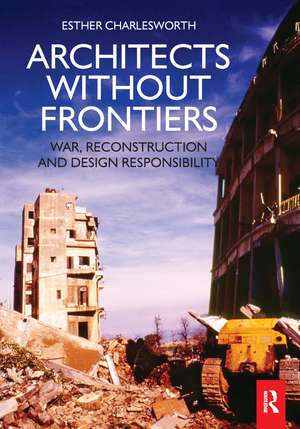Architects Without Frontiers
Autor Esther Charlesworthen Limba Engleză Hardback – 26 aug 2016
The title of this timely and inspiring new book, Architects Without Frontiers, points to the potential for architects to play important roles in post-war relief and reconstruction. By working “sans frontières”, Charlesworth suggests that architects and design professionals have a significant opportunity to assist peace-making and reconstruction efforts in the period immediately after conflict or disaster, when much of the housing, hospital, educational, transport, civic and business infrastructure has been destroyed or badly damaged.
Through selected case studies, Charlesworth examines the role of architects, planners, urban designers and landscape architects in three cities following conflict - Beirut, Nicosia and Mostar - three cities where the mental and physical scars of violent conflict still remain. This book expands the traditional role of the architect from 'hero' to 'peacemaker' and discusses how design educators can stretch their wings to encompass the proliferating agendas and sites of civil unrest.
Preț: 766.24 lei
Preț vechi: 1155.78 lei
-34% Nou
Puncte Express: 1149
Preț estimativ în valută:
146.62€ • 153.08$ • 121.35£
146.62€ • 153.08$ • 121.35£
Carte tipărită la comandă
Livrare economică 04-18 aprilie
Preluare comenzi: 021 569.72.76
Specificații
ISBN-13: 9781138175556
ISBN-10: 1138175552
Pagini: 190
Dimensiuni: 165 x 234 mm
Greutate: 0.57 kg
Ediția:1
Editura: Taylor & Francis
Colecția Routledge
Locul publicării:Oxford, United Kingdom
ISBN-10: 1138175552
Pagini: 190
Dimensiuni: 165 x 234 mm
Greutate: 0.57 kg
Ediția:1
Editura: Taylor & Francis
Colecția Routledge
Locul publicării:Oxford, United Kingdom
Public țintă
Professional Practice & DevelopmentCuprins
FOREWORD; ACKNOWLEDGEMENTS; LINES OF CONTENTION – ZONES OF CONNECTION; ARCHITECTS AND WAR; ARCHETYPES; BEIRUT – CITY AS HEART VS. CITY AS SPINE; NICOSIA – RECONSTRUCTION AS RESOLUTION; MOSTAR – RECONSTRUCTION AS RECONCILIATION; FROM ZONES OF CONTENTION TO LINES OF CONNECTION – IMPLICATIONS FOR THE DESIGN PROFESSION; ARCHITECTS WITHOUT FRONTIERS – IMPLICATIONS FOR DESIGN EDUCATION; REFERENCES
Descriere
From the targeted demolition of Mostar’s Stari-Most Bridge in 1993 to the physical and social havoc caused by the 2004 Boxing Day Tsunami, the history of cities is often a history of destruction and reconstruction. But what political and aesthetic criteria should guide us in the rebuilding of cities devastated by war and natural calamities?
The title of this timely and inspiring new book, Architects Without Frontiers, points to the potential for architects to play important roles in post-war relief and reconstruction. By working “sans frontières”, Charlesworth suggests that architects and design professionals have a significant opportunity to assist peace-making and reconstruction efforts in the period immediately after conflict or disaster, when much of the housing, hospital, educational, transport, civic and business infrastructure has been destroyed or badly damaged.
Through selected case studies, Charlesworth examines the role of architects, planners, urban designers and landscape architects in three cities following conflict - Beirut, Nicosia and Mostar - three cities where the mental and physical scars of violent conflict still remain. This book expands the traditional role of the architect from 'hero' to 'peacemaker' and discusses how design educators can stretch their wings to encompass the proliferating agendas and sites of civil unrest.
The title of this timely and inspiring new book, Architects Without Frontiers, points to the potential for architects to play important roles in post-war relief and reconstruction. By working “sans frontières”, Charlesworth suggests that architects and design professionals have a significant opportunity to assist peace-making and reconstruction efforts in the period immediately after conflict or disaster, when much of the housing, hospital, educational, transport, civic and business infrastructure has been destroyed or badly damaged.
Through selected case studies, Charlesworth examines the role of architects, planners, urban designers and landscape architects in three cities following conflict - Beirut, Nicosia and Mostar - three cities where the mental and physical scars of violent conflict still remain. This book expands the traditional role of the architect from 'hero' to 'peacemaker' and discusses how design educators can stretch their wings to encompass the proliferating agendas and sites of civil unrest.
